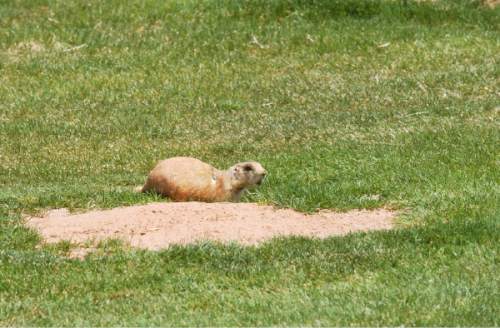This is an archived article that was published on sltrib.com in 2014, and information in the article may be outdated. It is provided only for personal research purposes and may not be reprinted.
A federal judge has rejected the U.S. government's justification for protecting the Utah prairie dog.
In a ruling issued Tuesday, U.S. District Judge Dee Benson struck down regulations on the capture and killing, or "takes," of the threatened rodent on non-federal land because wildlife managers could not prove the animal "has a substantial effect on interstate commerce."
The Pacific Legal Foundation sued 18 months ago on behalf of People for the Ethical Treatment of Property Owners (PETPO), a Cedar City group including local government leaders, who want to control the small mammal on private and public property, including in the town cemetery, at parks and on airport runways.
"This ruling frees the people of Cedar City from unconstitutional regulations that made it impossible for them to build their dream homes, defend their airport and protect the sanctity of their loved ones' final resting places," said Jonathan Wood, staff attorney with the California-based legal foundation.
In southwestern Utah, where most of the prairie dogs live, ranchers and local government leaders were assessing the impact of the ruling.
But state wildlife managers said they would continue to protect the rodents.
"The Division of Wildlife Resources supports the right of the state to manage all wildlife within its boundaries," said Greg Sheehan, director of the state Division of Wildlife Resources. "Our citizens should be aware that the Utah prairie dog is still a protected species under Utah law and cannot be legally killed or removed at this time."
Even Utah Sen. Orrin Hatch weighed in Thursday.
"This is the first time a federal court has found that Endangered Species Act regulations limiting the taking of a listed species exceed the scope of Congress's enumerated powers," Hatch said in a statement. "The court's decision confirms what we have said all along: The federal government has no business interfering with property rights where the allegedly endangered species has no connection to, or effect on, interstate commerce."
The two sides ended up making economic arguments to debate wildlife protections because the U.S. Constitution's Commerce Clause allows the federal government to intercede in intrastate economic issues, including state gun and marijuana laws.
Many in southern Utah consider the animal a pest and its burrows a nuisance and a danger.
But federal wildlife managers argued the prairie dog actually impacts interstate commerce when its protection stops agricultural operations and land development. They also noted the dogs improve the soil where they burrow. And large predators, including golden eagles, hawks and bobcats, prey on the little animals.
Benson rejected those arguments.
"Although the Commerce Clause authorizes Congress to do many things, it does not authorize Congress to regulate takes of a purely intrastate species that has no substantial effect on interstate commerce," Benson wrote.
Unique to the state, nearly 100,000 Utah prairie dogs lived in eight of the state's counties in the 1920s. But after decades of eradication programs, the population dropped to 3,300 in the 1970s.
More recent estimates set the population around 40,000. It currently is listed as "threatened" on the Endangered Species List.
U.S. Fish and Wildlife officials are "in the process of evaluating the court decision," said Laura Romin, assistant field supervisor for the agency's Utah office.
Meantime, southern Utah ranchers, airport managers and government leaders were doing the same.
"I don't think it will affect us much," said Dave Christensen, president of the Parker Mountain Grazers Association in Wayne County.
Christensen says the prairie dog population on the mountain and at the Wayne Wonderland Airport has been kept in check. But he believes more populated areas, including Cedar City, should be able to control the rodent population, if only for health reasons. Prairie dogs can carry bubonic plague and monkey pox.
"People tolerate the animals until they start digging up the graves or eating the flowers," Christensen said. "And if you've got a bunch of rodents digging up your yard, it's the property owners' right to remove them."
Another lawsuit challenging the U.S. Fish and Wildlife Service's decision permitting developments on prairie dog habitat in Garfield and Iron counties still is pending.
Tribune reporter Thomas Burr contributed to this report.



